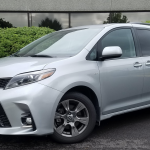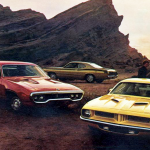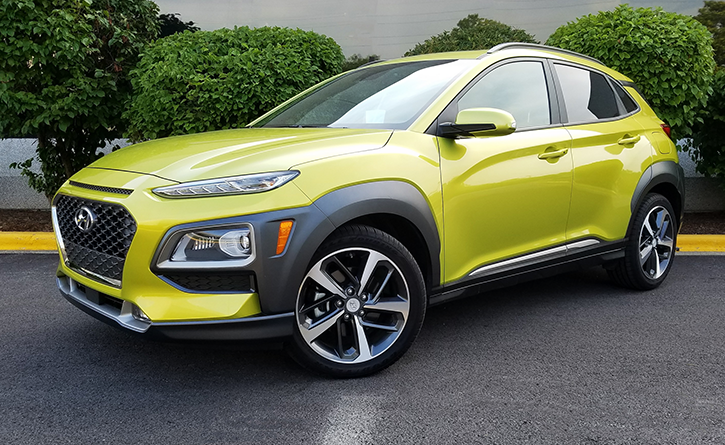
 2019 Hyundai Kona Ultimate AWD
2019 Hyundai Kona Ultimate AWD
Class: Subcompact Crossover
Miles driven: 534
Fuel used: 20.8 gallons
| CG Report Card | |
|---|---|
| Room and Comfort | B |
| Power and Performance | B+ |
| Fit and Finish | B |
| Fuel Economy | B |
| Value | A- |
| Report-card grades are derived from a consensus of test-driver evaluations. All grades are versus other vehicles in the same class. Value grade is for specific trim level evaluated, and may not reflect Consumer Guide's impressions of the entire model lineup. | |
| Big & Tall Comfort | |
| Big Guy | B+ |
| Tall Guy | B+ |
| Big & Tall comfort ratings are for front seats only. "Big" rating based on male tester weighing approximately 350 pounds, "Tall" rating based on 6'6"-tall male tester. | |
| Drivetrain | |
| Engine Specs | 175-hp 1.6-liter |
| Engine Type | Turbo four |
| Transmission | 7-speed automatic |
| Drive Wheels | AWD |
Real-world fuel economy: 25.7 mpg
Driving mix: 60% city, 40% highway
EPA-estimated fuel economy: 26/29/27 (city/highway/combined)
Fuel type: Regular
Base price: $28,900 (not including $980 destination charge)
Options on test vehicle: Carpeted floor mats ($125)
Price as tested: $30,005
Quick Hits
The great: Acceleration from turbocharged engine; generous list of comfort and safety features
The good: Respectable passenger and cargo room within tidy exterior dimensions
The not so good: Real-world fuel economy numbers trail EPA estimates
More Kona price and availability information
John Biel
Well, that didn’t take long.
A year after the Hyundai Kona entered the subcompact-crossover field, it found itself welcomed into the fold of Consumer Guide “Best Buys” for 2019, thanks to its “driving manners and all-around practicality, and . . . peppy available turbo engine and rare-for-the-class comfort and convenience features.”
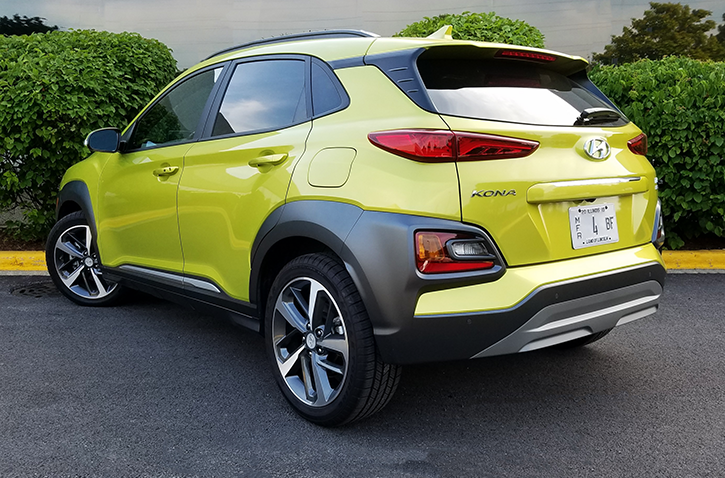
That said, to fully appreciate all the things CG praises about the Kona requires driving one of the higher-end models. The little Hyundai SUV comes in five trim levels encompassing two gas engines—plus a new-for-’19 Kona Electric—but only the Touring, Ultimate, and movie-inspired Iron Man Edition have the 1.6-liter turbocharged four-cylinder engine. This time we drove an Ultimate, which is the level at which pedestrian detection, parking-distance warning, navigation, 8-inch color touchscreen, 4.2-inch color vehicle-information display, wireless device charging, head-up display, and enhanced Blue Link telematics enter the picture as standard equipment.
Steve and Johnnie Road Test: 2019 Hyundai Kona Ultimate (video)
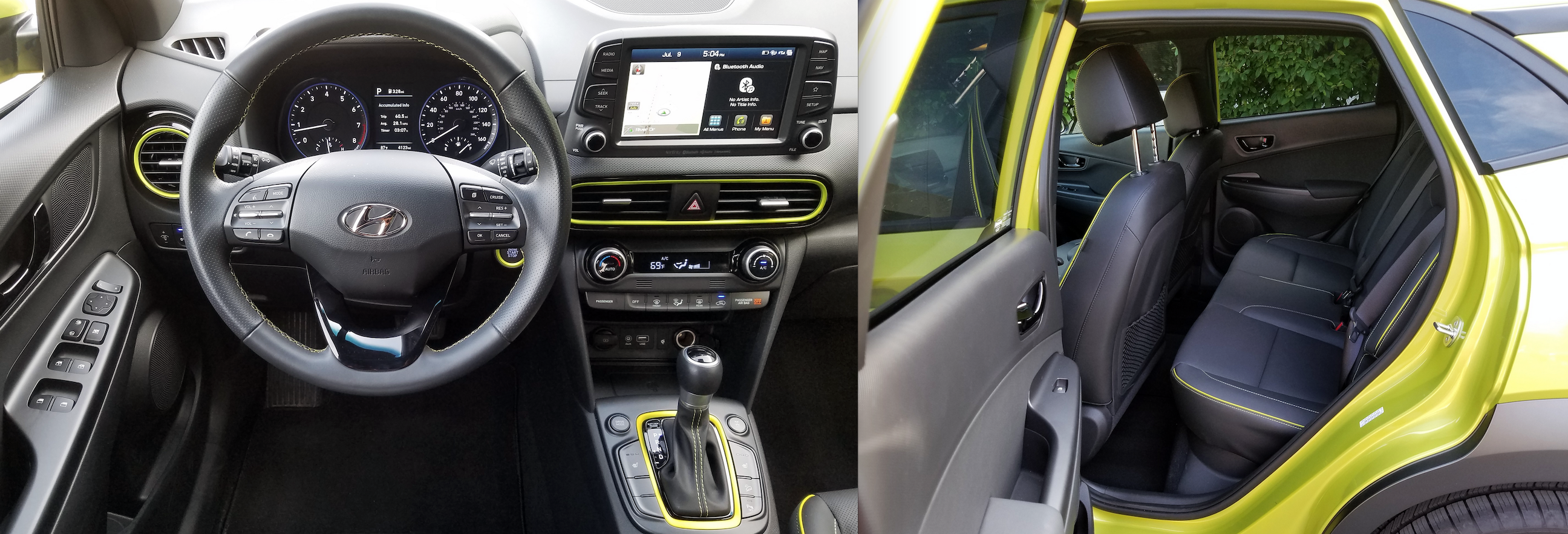
The turbo powerplant whips up 175 horsepower at 5500 rpm and 195 lb-ft of torque between 1500 and 4500 rpm, figures that place it near the top in the Kona’s class. Paired with a 7-speed dual-clutch automatic transmission, it is pleasingly eager off the jump—CG tests clocked it at 7.6 seconds for 0-60-mph acceleration—and alert downshifts give it effective passing capability. A choice of “Normal” or “Sport” driving modes comes at the press of button on the console, with Sport triggering altered shift timing to wring out more revs between gear changes.
Test Drive: 2018 Hyundai Kona SEL
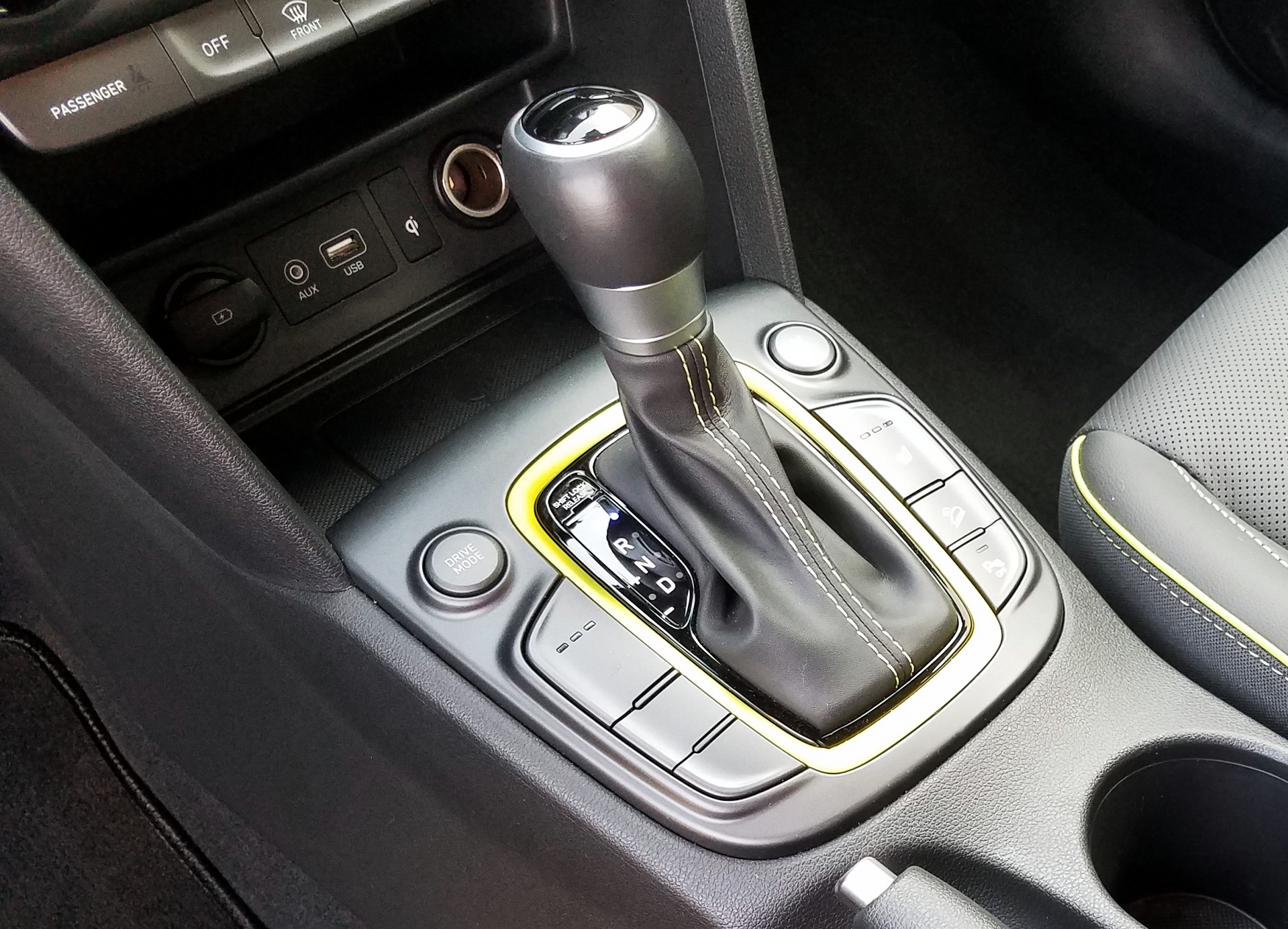
An all-wheel-drive Kona Ultimate like the test vehicle is rated by the EPA to get 26 mpg in city operation, 29 mpg in open-road driving, and 27 combined. When this reviewer put 119 miles on it—with 60 percent city-type driving—he averaged just 23.5 mpg. That’s the bad news. The better news is that other CGers all did better, including one highway-heavy turn that yielded 27.8 mpg.
Blessed with a tidy exterior footprint, the Kona handles easily with good maneuverability. However, in this driver’s commuting experience, the test truck wanted to wander slightly on the expressway, prompting lots of small steering corrections. Even with 18-inch alloy wheels—the largest available and standard on the Ultimate—ride from the front-strut/rear-multilink suspension is only seriously upset by severe road imperfections.
One reason why the Kona is a Best Buy designee is because it provides generous passenger and cargo room despite being one of the smallest subcompact SUVs. Front-seat passengers enjoy fine head- and legroom. Headroom is ample in back, and legroom for two adults only gets truly tight if the passenger ahead tracks all the way back. However, short footroom can complicate exits. Drivers will find good sightlines, even to the rear corners, which not every small ute with a “sporty” roofline permits. The cargo area aft of the rear seats holds 19.2 cubic feet of stuff, but blossoms to 45.8 cubic feet with the second-row seats down. Loads enter at bumper height, and there’s small-item storage available in a pair of stacked foam organizers under the floor. The 60/40-split rear seats drop almost flat and make a smooth transition from the load floor.
Test Drive: 2019 Toyota C-HR Limited
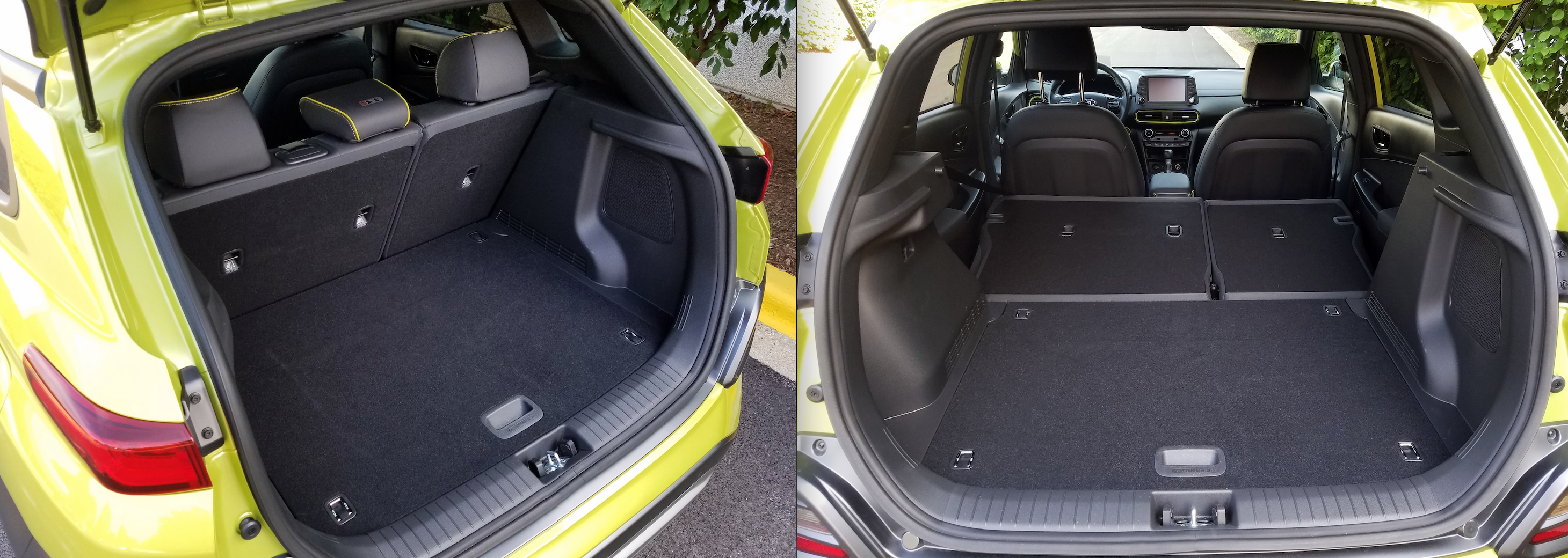
The Ultimate includes leather-upholstered seats to go with a leather-wrapped steering wheel and shifter knob, plus armrests, door centers, and dash center with soft surfaces and a bit of underlying give. This is a clear upgrade from lower-level models, which come off as somewhat spartan—especially relative to some rival products. CG’s test vehicle was painted a vibrant metallic Lime Twist, and touches of this color were reprised on the seat, steering-wheel, and shifter-boot stitching, as well as moldings around the air vents, starter button, and shifter. Comfortable heated front seats have a bit of side bolstering for grip.
Test Drive: 2020 Kia Soul GT-Line Turbo
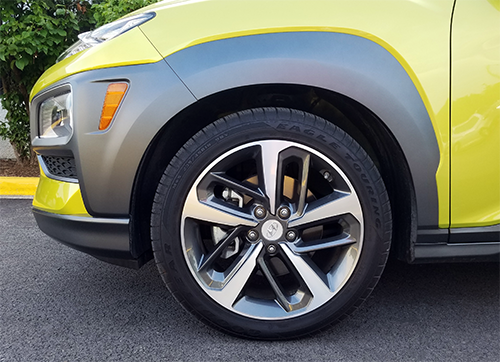
Driver-oriented gauges and the central information display show up well, and secondary controls on the dash and steering wheel are easy to reach and operate. The touchscreen is flanked by buttons that activate the various infotainment choices, but managing them on the screen is easy and direct. The automatic climate-control unit has no-fuss dials for temperature and fan speed, with a short row of function buttons—including for mode—underneath. Device inputs and power plugs reside the forward portion of the console, near the Qi wireless-charging pad.
For cabin storage, there’s a pretty big glove box, modest console box, door map pockets, and in-console cup holders up front. Rear-seat accommodations include a net pouch on the back of each front seat, smaller door pockets, and dual cup holders in the pull-down center armrest.
The Ultimate AWD starts at $29,880 with delivery. (Chip off $1400 if you can get by with front-wheel drive.) With the extravagance of a set of carpeted floor mats lavished on the test vehicle, its final price came to $30,005. In addition to the items previously mentioned, a Kona of this grade also has automatic high-beam headlights, LED headlights and taillights, fog lights, side roof rails, heated exterior mirrors, power sunroof, and rain-sensing windshield wipers. Other standard interior features list a tilt/telescoping steering wheel, keyless entry, push-button starting, 8-way power-adjustable driver’s seat, and an auto-dimming rearview mirror with built-in compass. Convenience and safety tech consists of an 8-speaker Infinity premium audio system with HD and satellite radio, Apple CarPlay and Android Auto connectivity, forward-collision warning with automatic emergency braking, driver-attention warning, lane-keep assist, lane-departure warning, blind-spot monitor, and rear cross-traffic alert.
On balance, the Hyundai Kona is as livable as it is likeable. It won’t take long behind the wheel to figure that out.
Test Drive: 2019 Nissan Kicks SR
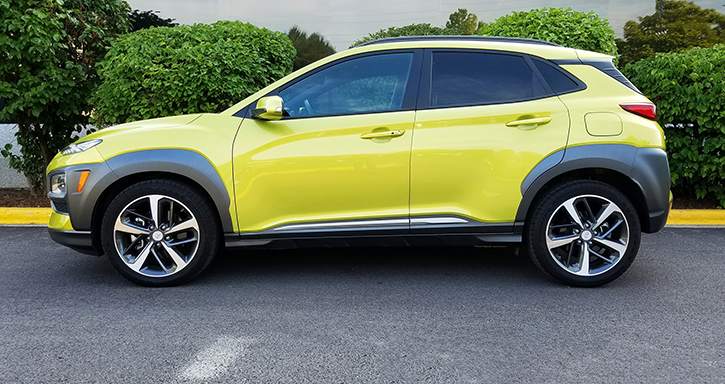
Steve and Johnnie Road Test: 2019 Mazda CX-3 Grand Touring (video)
Hyundai Kona Ultimate

